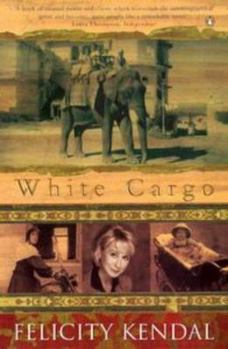White Cargo : A Memoir
Select Format
Select Condition 
Book Overview
Felicity Kendal was brought up in India, touring the country as part of a troupe of actors managed by her father. Aged 17, she came to England for the first time. This book describes that exotic... This description may be from another edition of this product.
Format:Paperback
Language:English
ISBN:0140271589
ISBN13:9780140271584
Release Date:January 1999
Publisher:Gardners Books
Length:352 Pages
Weight:0.60 lbs.
Dimensions:7.8" x 1.0" x 5.3"
Customer Reviews
2 ratings
The interesting life of an Icon
Published by Thriftbooks.com User , 19 years ago
Felicity Kendal's life is everything but ordinary. Growing up in India as part of a traveling theatre company managed by her parents left her with little option of education or career. Ms. Kendal describes her childhood in India, the feelings of not fitting in in her 'native' England and the struggle to find a place. The story begans as a one sided conversation with her ailing father in a long term care facility. Moving smoothly between the past and present, the reader experiences the difficult aspects of her childhood, her love of India, the death of a much loved sister, and finally finding a place in the theatre of London. A well written and insightful book. I would recommend 'White Cargo' to any fan of this respected british actress or to anyone who has experienced the illness of a difficult, but loved parent.
White Cargo - A Golden Story
Published by Thriftbooks.com User , 20 years ago
This book was quite a revelation for me as I have always been a fan of Felicity Kendall's TV comedy shows but had no idea that she grew up in India, where I spent much of my childhood at about the same time. Frequent references to places like Breach Candy in Bombay, and the Maidan and Chowringhee Road in Calcutta brought back vivid memories. So too did certain words and phrases like chowkidars (sort of watchman or servant), peons (messengers), dhobi (manual washerman or lady), chota pegs (small whisky's) and pye-dogs (loose unfettered mongrels, often rabid). The descriptive writing is writing is evocative too and I quote the following passage from early in the book which aroused several senses in me: "A white mist hovered over the sprawling Maidan. In the early hours of the morning the dry grass looked lush with dew . . . the sickly sweet smell of the city had not yet taken hold of the day, and, in the cool air, the sounds of barking pye-dogs were still faint. Across the Maidan large black crows cawed and swooped at one another from the tall trees, and in the distance people walked and bicycled their way to work along the footpaths, municipal peons in their khaki shirts and bush shirts, pressed into starched creases that would not last till lunchtime, vendors in dhotis, their baskets of ware balanced perfectly on their heads, arms swinging freely in easy confidence." How brilliant is that?This is not only a fascinating and entertaining autobiography but it is also entwined with the parallel story of Felicity's relationship with her father. The book carries a present day story line of her father lying very ill in hospital in the autumn of his life together with Felicity's own story throughout her life.Felicity was taken to India by her parents as a baby as her father managed a travelling theatre specialising in the works of Shakespeare. The huge population of India together with their recent colonial British heritage meant that there was a potentially large audience the length and breadth of the sub-continent. The lifestyle of the family and acting troupe varied from splendid to meagre according to the cash flow and income generated by the performances. They boarded in splendour with Indian royalty on some occasions and in humble, if not run down lodgings on others. Felicity's first speaking stage performance was at the tender age of 9 and from then on that was to be her life. At age 18 she returned to England, against her father's will, on her own, to forge her own way in the world of theatre and found that England was a foreign country to her altogether. Never before had she owned a coat or worn gloves or stockings but the English climate dictated that she did so then. The cultural change was difficult to get used to as was the formal or strict attitude of the British compared to the more laid back philosophies espoused by the Indians. The story takes us through her whole life from growing up in India and learning first to speak Hindi like a na




